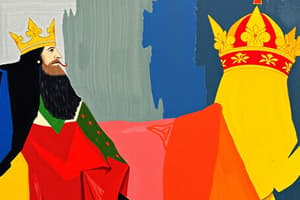Podcast
Questions and Answers
What is absolutism?
What is absolutism?
- A form of government with limited powers
- A form of government in which the ruler is an absolute dictator (correct)
- A democracy with multiple parties
- An anarchy without a central government
What is an absolute monarch?
What is an absolute monarch?
A king or queen who has unlimited power and seeks to control all aspects of society.
What does the divine right refer to?
What does the divine right refer to?
The idea that monarchs are God's representatives on earth.
What is a czar?
What is a czar?
Who are the boyars?
Who are the boyars?
Who was Phillip II?
Who was Phillip II?
What was Louis XIV known for?
What was Louis XIV known for?
Who was Ivan the Terrible?
Who was Ivan the Terrible?
What did Peter the Great do?
What did Peter the Great do?
Who was James II?
Who was James II?
What was the War of Spanish Succession?
What was the War of Spanish Succession?
What was the Seven Years' War?
What was the Seven Years' War?
What was the English Civil War?
What was the English Civil War?
What was the Glorious Revolution?
What was the Glorious Revolution?
What is a constitutional monarchy?
What is a constitutional monarchy?
What is a parliament?
What is a parliament?
What is a cabinet?
What is a cabinet?
What is Habeas Corpus?
What is Habeas Corpus?
What does the English Bill of Rights stipulate?
What does the English Bill of Rights stipulate?
What is the Magna Carta?
What is the Magna Carta?
What is the geocentric theory?
What is the geocentric theory?
What is the heliocentric theory?
What is the heliocentric theory?
Who was Copernicus?
Who was Copernicus?
What did Kepler discover?
What did Kepler discover?
What did Galileo contribute to science?
What did Galileo contribute to science?
Who was Descartes?
Who was Descartes?
What did Newton discover?
What did Newton discover?
Who was Boyle?
Who was Boyle?
Who are philosophers?
Who are philosophers?
What does the social contract entail?
What does the social contract entail?
Who was Hobbes?
Who was Hobbes?
Flashcards are hidden until you start studying
Study Notes
Key Terms and Definitions
- Absolutism: A government system where the ruler has no legal restrictions, acting as an absolute dictator.
- Absolute Monarch: A sovereign, such as a king or queen, with unlimited power aiming to control all societal aspects.
- Divine Right: The belief that monarchs are God's representatives on Earth, accountable only to God.
- Czar: The title for a Russian emperor.
- Boyars: The landowning nobility of Russia.
Historical Figures in Absolutism
- Phillip II: King of Spain, notable for his control over the Spanish and Portuguese Empires, military strength, and wealth acquired from gold and silver.
- Louis XIV: French monarch known as the "Sun King", increased taxes for wealth expansion, sought to extend France’s territorial boundaries, and built the lavish Palace of Versailles.
- Ivan the Terrible: Russian ruler who established a code of laws, was notorious for eliminating perceived traitors, and redistributed land based on loyalty.
- Peter the Great: Tsar of Russia who westernized the nation by traveling undercover in Europe, introduced new agricultural practices, built St. Petersburg, and limited landowner power.
Important Events and Conflicts
- James II: King of England whose overt Catholicism led to his ousting during the Glorious Revolution.
- War of Spanish Succession (1701-1713): European conflict aimed at preventing the Bourbon dynasty from ruling both Spain and France.
- Seven Years' War (1756-1763): Global conflict involving Britain and Prussia against Austria, France, and Russia, impacting several continents.
- English Civil War (1642-1649): A struggle between Parliament supporters and royalists, led by Puritans against the monarchy.
- Glorious Revolution: A peaceful transition of power from James II to William and Mary in England.
Governance and Political Concepts
- Constitutional Monarchy: A system where the monarch's powers are legally restricted by a constitution.
- Parliament: A representative body that creates laws for a nation.
- Cabinet: Advisors chosen by the head of state to assist in government decision-making.
- Habeas Corpus: Legal requirement to bring prisoners before a court to determine the legality of their detention.
- English Bill of Rights: Legal document affirming no suspension of laws, taxation without representation, and freedom of speech in Parliament.
- Magna Carta (1215): Landmark document affirming basic political rights in England, established by nobles and enacted by King John.
Theories and Scientific Discoveries
- Geocentric Theory: Belief that the Earth is the center of the universe with the sun revolving around it.
- Heliocentric Theory: Assertion that the Earth orbits the sun, revolutionizing understanding of the cosmos.
- Copernicus: Proposed heliocentric theory, published at the end of his life in 1543.
- Kepler: Discovered that planetary orbits are elliptical and formulated mathematical laws governing motion.
- Galileo: Pioneer in physics and astronomy, known for his work on gravity, pendulum laws, and telescope invention.
- Descartes: Developed the scientific method and contributed to analytical geometry, promoting systematic investigation.
- Newton: Formulated the laws of gravity, demonstrating a mathematical foundation for physical laws.
- Boyle: Established foundational principles in chemistry, particularly the relationship between gas pressure and volume.
Enlightenment Thinkers
- Philosophers: Individuals who apply logic and reason to ponder life's fundamental questions, often seeking wisdom.
- Social Contract: The theory that individuals willingly surrender some rights for government protection.
- Hobbes: Believed in the selfish nature of humans, advocating for a strong government to maintain order and prevent chaos.
Studying That Suits You
Use AI to generate personalized quizzes and flashcards to suit your learning preferences.




